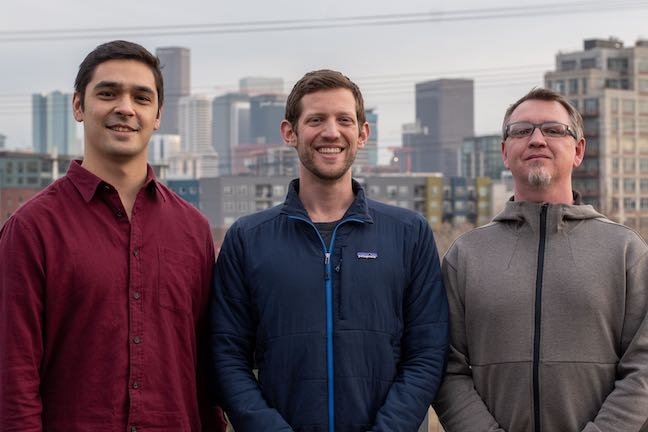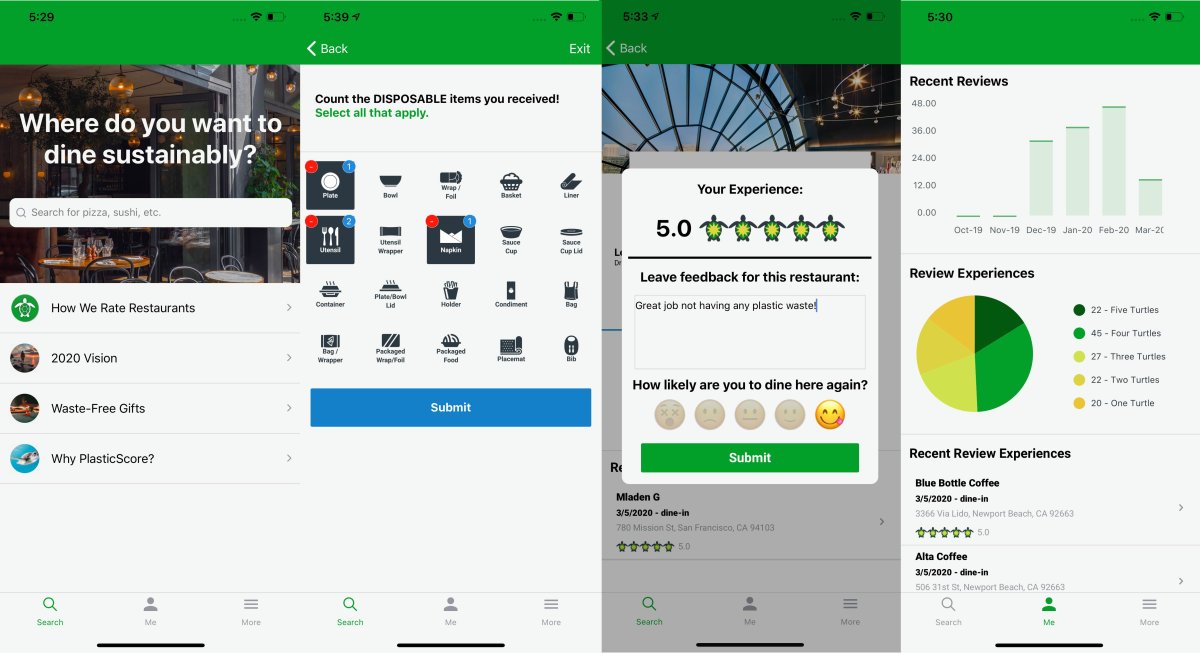More taste, less waste

Photo courtesy of Mladen Gajic.
CSE alumnus launches sustainability rating app for restaurants
July 10, 2020
People can spend hours scouring online restaurant reviews to find the perfect place to eat. But, what’s often absent from these is a sustainability score—in other words, how much waste do eateries generate through giving out materials like plastic utensils and Styrofoam boxes to customers?
That is exactly the question that inspired College of Science and Engineering alumnus Mladen Gajic to create PlasticScore, a crowdsourcing app that garners information from diners to give restaurants zero-waste ratings.
Gajic, who graduated in 2012 with a bachelor’s degree in mechanical engineering, met his two co-founders, Paul Fuqua and Tim Furlong, at a tech startup weekend in Boulder, Colo. After brainstorming business ideas, they found a common thread: trash.
“[Paul] was like, ‘I hate going to Chick-fil-A with my family, and we get all of this Styrofoam, and we’re cramming all of this trash in the trash can,’” Gajic said.
“We thought we should do something about it,” he said.
According to nonprofit Plastic Oceans International, an estimated 8 million tons of plastic ends up in the world's oceans every year. And, the United States Environmental Protection Agency estimates that food and packaging containers account for 45 percent of materials in U.S. landfills. There is also evidence that plastics contribute to climate change, pollute our food and drinking water, and can even result in microplastic particles falling with the rain.
Gajic and his co-founders aim to both curb these affects and raise awareness of plastic usage in the food industry—with the help of the average restaurant goer.
PlasticScore is currently holding a Plastic Free July challenge, in which Gajic and his colleagues will pick up one piece of trash for every single-use item users mention in their in-app reviews. Those who leave reviews will be entered for a chance to win a gift card to a black-owned business in their area.
Turtles tell all
PlasticScore functions by gathering information from its users on what materials they receive when they go out to eat—straws, napkins, plastic bags, and takeout boxes, to name a few. The app then creates a zero-waste score of 1-5 “turtles” for the restaurant based on the sustainability of the items. For example, Styrofoam is the least sustainable, compostable objects are better than plastics, and reusables are the best.
In addition to serving as a guide for consumers, Gajic hopes the ratings will incentivize businesses that receive lower scores to take the steps to reduce their plastic waste.

PlasticScore hit app stores in mid March. It already has around 700 U.S. restaurant reviews, ranging from fast food to sit-down, despite launching amid the COVID-19 outbreak.
Ironically, many restaurants are starting to use more single-use and plastic items during the pandemic. The Centers for Disease Control and Prevention actually recommends restaurants use these items instead of reusables to limit spreading the disease. However, many scientists now agree that reusables can be just as safe if disinfected after each use.
“There’s definitely that public perception of safety with single-use, and we understand if restaurants are going in that direction,” Gajic said.
“We want to support the restaurant industry, but also put a focus on sustainability and help move both of those things along,” he said.
Gajic encourages everyone to use PlasticScore when they go out to a restaurant, whether it’s dine-in or delivery. The company is based in Denver, Colo., but the app can be used anywhere in the United States.
“We tell our users to go out and eat as much as possible so we can collect this data,” Gajic said. “We want to have a world where you don’t solve plastic pollution by not going to restaurants, you solve plastic pollution by restaurants providing reusables and the right practices where you don’t have to worry about creating waste.”
A sustainable mindset
Gajic worked at Xcel Energy before switching his focus to entrepreneurship. But, his interest in energy and the environment surfaced when he was a student at the University of Minnesota. As an upperclassman, he took a CSE global seminar course on wind energy in northern Europe.
“That was just an amazing experience to see the nuts and bolts of how these sustainable initiatives got pushed forward by different organizations and companies,” he said.
“I was already interested in sustainability, but that really kind of cemented in me that that was the path I wanted to go down—to work to do something about climate change.”
With PlasticScore, Gajic hopes interest in eating sustainably will go viral—not just in the U.S., but worldwide. Once the app gets enough reviews, they could eventually license out their scores to companies like Yelp and Google, making the five-turtle rating the standard.
“Even if you’re not a zero-waste fanatic, you can still see, ‘Hey, this place got two turtles and this place got five turtles. Let’s go with the five-turtle place,’” Gajic said. “It’ll slowly drive people’s decision-making, and then hopefully we’ll have restaurants coming to us and asking how they can improve their PlasticScore. And we’d love to help them do that.”
That's the next step. Going forward, the founders hope to identify the best waste-free practices from the restaurant industry to share with other businesses.
“We’re trying to figure out how to get a rating for every single restaurant out there in the world,” Gajic said. “Then we can give people the baby steps they can take toward becoming more sustainable.”
Story by Olivia Hultgren
Learn more about the company’s mission on the PlasticScore website.
